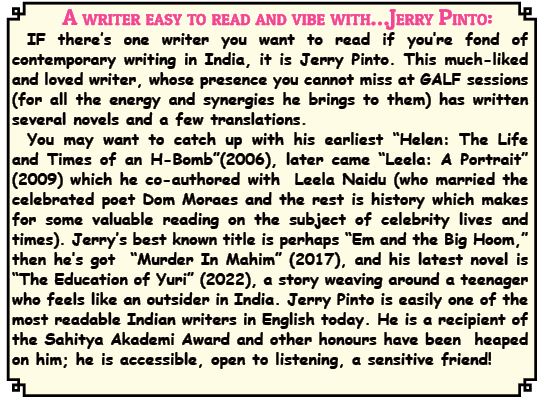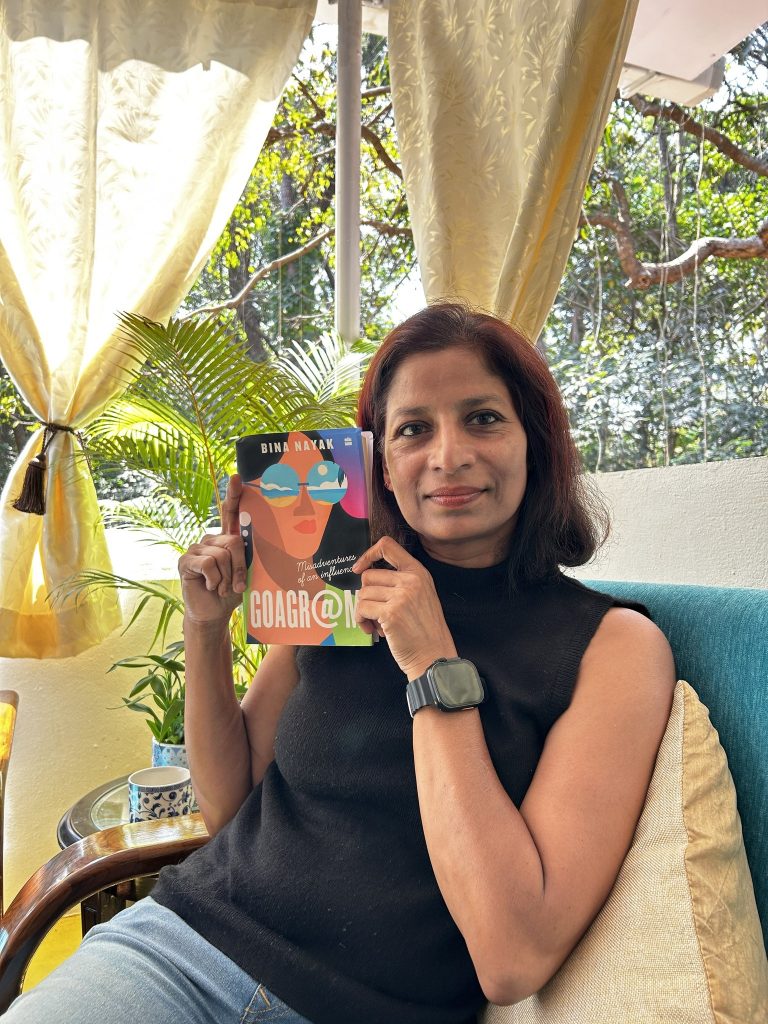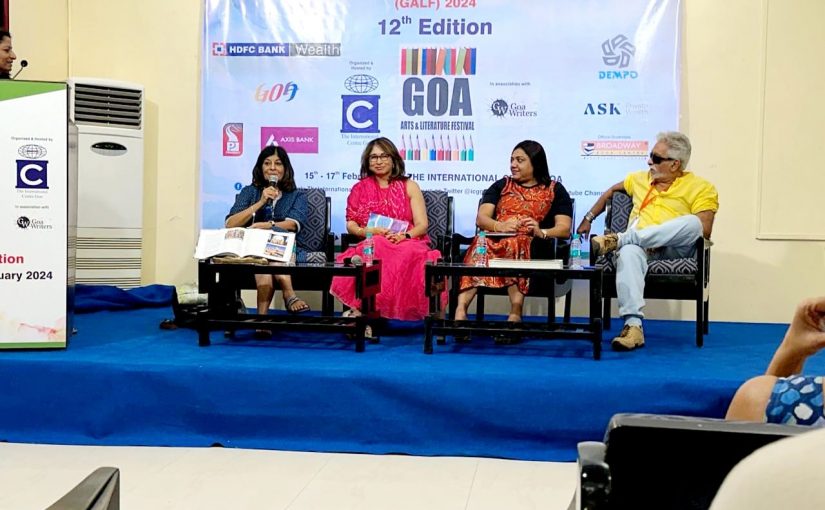Who’s writing, reading, buying online and offline!
IN Goa’s early February heat with the mango trees already in bloom it was a treat to run away to catch up with some art, literature and food for thought at the cosy and inclusive three-day 12th Goa Arts & Literature Festival hosted by the International Centre Goa as usual. Give social media a break! I dare say the world is returning to reading books in hand as in the good old-fashioned days and that’s good news.
GALF was on from packed quite a large number of new book releases and looking at the Broadway Book Shop spread of books here I was zapped anew. There were too many books to read even if not enough funds to buy them, so one had to be choosy. And I thought nobody was reading books anymore! Think again. I asked Jerry Pinto about how just about everybody is writing books, who’s reading them? I mean are more people writing books than reading them and he said, don’t knock it. The market for books grows and he himself is booked up for the next few years, “If you want to write a book, just go ahead!”
There all kinds of books waiting to be written and you don’t have to depend on a publishing house to make you wait for years or market anything for you anymore. The world is your oyster with online offers or something like that. In one of the GALF20-24 sessions the enormously successful writer Joe Alvares put it succinctly when he said just choose your subject of passion, find your sponsor interested in the subject and even your market is booked – your bank account flush with funds to move on to another writing adventure.
Today there are more genres of book and there are also e-books with many reading on Kindle tablet or Google downloads; yes, the classics of old and the new ones in print or not in print but you may download the e-books getting a lot of notice on the Internet book review clubs and groups. There is no dearth of subjects to write a book on. Novels, short stories, essays, poetry is still alive kicking (think the by now very recognized fiery Tamil Meena Kandaswamy who writes breathtakingly on political injustices, she was there for the release of her book “Tomorrow Someone Will Arrest You” and presumably nobody will say anything, is that the kind of country we’re becoming, like Russia or China or even Israel?).
Lots of other books for children and heavy hardcover coffee-tabler about the difference between biryani and pilaf, or adventures and misadventures in exotic destinations including the Antarctica in minus zero temperatures…and more add-ons, for example children have become a huge reading market. The young generation has taken to graphic novels – more graphics, and succinctly written dialogue-style narrative.
LOOK, even our politicians have taken to writing their stories to be immortal, regardless of whether the stories are heroic overtly and covertly (depending on the expertise with which they’re written)! Most are white-washing vanity box narratives but the number of professionals ghosting books for celebrities and politicians is growing. Ghost writers have always been around; if someone with flair can do a readable job of writing up somebody else’s story of life and times in private and/or public– why not? The goodie stuff is written about, the baddie stuff is glossed over or forgotten (with only discerning readers remembering). Celebrities have mass followers and seek visibility to rake in fame for on its wake they earn their fotunes. Indeed, ghost writing is highly honed talented business, very lucratively paid for naturally. Ghost-writers earn a decent and may be even an indecent living!
THERE were all kinds of new books galore vying with one another at GALF which happened on February 16/17/18 at the International Centre of Goa which has been regularly hosting the festival annually. It’s not one of your flashy much promoted lit festivals but a small is beautiful inclusive festival, which quite a few Goans and my friends from Mumbai like to attend if only to catch up with old friends. All this is to say the I-want-to-write-a-book bug is alive and kicking in most all of us, go right ahead with it.
Books released? Here’s a rough guide: `I Named My Sister Silence” by Manoj Rupda, “Water From A Broken Pot: A Memoir” by Yogesh Naitreya, “The Day I Became A Runner: A Women’s History of India Through the Lens of Sport” by Sohini Chhatopadhyay, “The last Courtesan: Writing My Mother’s Memorir” by Manish Gaekwad (his book invited quite a bit of attention, a must read), “Lisbon, Goa, Vijaynagara: Tejo Tungabhadra” by the very inimitable writer Vasudhendra (these historical fiction books have become popular and fascinating reading, but the research the authors put it rakes up dangerous historical incidences not fiction and you don’t know who will drag it up for closer scrutiny in today’s incendiary times).
Other books: Rahul Alvares’ “Snakes of
Goa,” “Ways of Belonging” by Sheela Jaywant, “Notes On A Marriage” by Selma Carvalho, “Goagram” by Bina Nayak, “The White Shirts of Summer” by Mamang Dai, “The Miracle of Salt” by Naomi Dai (which intrigued me a lot but I didn’t buy it), “Ek Tarha Ka Pagalpan” by Rahman Abbas also sounds interesting, and of course Meena Kandasamy’s “Tomorrow Someone Will Arrest you.”
And some more: “The Cobra’s Gaze: Exploring India’s Wild Heritage” by Stephen Alter and Jerry Pinto’s latest “Behold! The Word is God: Hymns of Tukaram.” Translations from the regional languages of the country are profitable challenges now for remember India comes with 28 states and 780 languages…smoke on the opportunities you can open up if you qualify. Even in Goa translations from the original Konkani to English and other major languages of India and other countries are going places. A highlight at this year’s GALF was Goa’s 57th Jnanpith Award winner Damodar Mauzo in conversation with Jerry Pinto. Pinto has translated Mauzo’s novel “Boy Unloved” from the original Konkani titled “Jeev Divum Kai Chya Marum.” Mauzo’s most famous novel “Karmelin” is also available in English translation now.
Take new poetry translations: “Paranoia In That Mill, I Too Was Forged” by Jerry Pinto and Mustansir Dalvi. The writing bug is alive and kicking all around and many are bitten…it’s anyone’s guess how many read e-books now? E-books are something my generation of readers in their 70s plus, plus may not feel comfy with for they grew up with books in their hands right from childhood, when they were introduced to comics, educational text books, novels serious and not so serious – romances, historicals, whodunnits, thrillers, fun books, etc.
The awards and rewards too today are many and one more folk are writing and selling out and not starving in a garret! Good books are winning praise, awards, monetary rewards – the number of literary festivals are growing worldwide and it is making a difference to the world, in some powerful inspirational ways surely! How many books are there in the world today? We don’t know or do we and the list is growing.
This is also true: At the Broadway Book Shop spread at GALF I spent considerable time deciding if I wanted to buy one book or two and which one? Most softcovers are priced Rs400-Rs600; hardcovers go up steeply at Rs1,000 plus. At one time it was second nature and easy to buy books which caught one’s imagination, but in today’s fast-paced inflationary rat-race, few have time to pick up a book between catching all the action on social media being churned up in their smart phone in hand – everything one may desire warming up on user-friendly small screens of various dimension. The college kids who filled up seats at the GALF sessions on discussions, conversations, book releases, couldn’t afford to buy any books even if they wanted to read them! I noticed, they didn’t even look or touch any of the books.
So what does it matter if I say if the choice is between social media or a book, go for books! The pity of it is that most young people don’t have money to buy books, while I’m a senior citizen with too many books lining my shelves …at one time if one were in a media profession attached to a newpaper or magazine, one was deluged with books sent if for reviewing and editors would say, “Take this book and review it for this weekend’s magazine section.” My editors never asked to return the books reviewed!
(Sigh) How much the world has changed courtesy the gifts of quick fix comfort technology. One may read a book any which way one is comfortable with. But in my case I’m appealing to bookshops to lend me a book I need or want to read to review only – and yes, I will return the book in a week, failing which I will buy it. That’s what I’m doing nowadays.
This said if there was something like THE book of GALF 2024, I would say it has to be Bina Nayak’s “Goagra@m” – this one is for Goa lovers and some more, it is as unputdownable as her other title “Starfish Pickle.” This author knows her Goa very well and is easily Goa’s most readable, heart-warming writers. Reading “Goagra@m” sent an eerie chill through my soul though as I wondered if this is the Goa in fiction only or it comes alive in non-fiction? If you’re a Goan at heart you need to read this book, it’s softcover, Rs399 (HarperCollins Publishers).+

`Misadventures of an influencer, Goagr@m’ by Bina Nayak, fiction, HarperCollins, 2024, softcover, Rs399
ABOUT REINVENTION AND RESILIENCE!
By Tara Narayan
HERE’S another treat of a novel from Goa-based designer, artist and writer with a sensitive soul — Bina Nayak’s `Misadventures of an Influencer, Goagra@m’ was released at the three-day Goa Arts and Literary Festival at the International Centre Goa from February 16 to 18, 2024. I missed the launch conversation between the author and Clyde D’Souza and Maria Goretti on February 16 at GALF 2024 and wish I’d been there!
This one is for today’s social media-crazy generation. It weaves the story of a young Madhur Chopra who leaves a stressed-out COVID-infested Delhi, plus a nagging mother, to escape to tranquil Goa which can easily become a paradise in hell, depending on whom you want to make a video or reel about to air on any one of the social media channels be it Instagram but better still UTube (where you can mint a fortune if you manage to catch zillions of eyeballs, at least enough to live in peace in Goa). Making videos to enchant the world is today’s passionate preoccupation amateurishly or professionally.
So our friend Madhur who is a delicious combination of intrepid adventure and cool spirit of rolling with what life throws at you….discovers to her chagrin that life is full of pitfalls and gets disillusioned after an unsavoury encounter with a celebrity living it up in Goa. It’s such a traumatic experience that she loses her joi de vivre in making her chatty videos to be praised or trolled!
She takes a shine to her Goan landlady of old and the motherly kindness she is treated, also realizes that life is not a rose garden but there are friends who will stand by and eventually after all early mishaps in life Madhur recovers confidence and poise and is back to doing what she loves to do and does best – designing ultra haute couture.
That old life is over when she was running away from her urban Delhi hassles of a mother constantly chasing her with the usual anxieties of a daughter of marriageable age. But Madhur is in love with some kind of a dream Dear Zindagi road lifestyle and of course her hand phone which she uses to put out sassy videos to woo a host of viewers of assorted feedbacks from bravo to good,
“Goagr@m” is an exquisitely insightful, sensitive and sensible read. It shows you both Goa’s nasties and niceties – but if you suffer the first then the bonus is the caring Goans who accept you as you so that you may recover and return to playing the game of life wiser and happier. This is a book I would describe to today’s selfie-crazy generation too!
Like I said this before, here’s a must read, thank-you Bina Nayak. Before I forget the illustrations which come along with the book are superbly evocative too.
Excerpted from `Misadventures of an influencer’ by Bina Nayak…..

It’s 9.00 p.m., and Karl , Jacinta and Madhur have been on their feet for almost eight hours now. In the general ward, a few beds are vacant and they finally get to sit and arrest their feet. Karl and Jacinta have only had breakfast, but Madhur has not eaten anything the whole day. They order some food and eat it, sitting beside Mrs Coutinho.
No matter how sombre the mood, the act of eating and sharing food somehow manages to lighten it. Karl cracks a few jokes about Mrs Coutinho, even addressing her – as if she can listen and respond. They all laugh and recollect some happy occasions. Just then Karl’s phone rings — it is Stella in a video call. She wants to see her mother before she passes. Karl holds the phone and shows her. Stella cries profusely, speaking in Konkani to her mother. Jacinta translates for Madhur.
Stella, come to Goa. We’ll keep her body in a refrigerated coffin till you arrive,’ Karl says to her,you missed your dad’s funeral because you had exams. That time you said, “Daddy will understand, he wanted me to study hard.” What’s your excuse now? And don’t say COVID-19 – my friend just returned from the UK, three days ago.’
Stella hesitates, ‘Karl, I’ve lost my job – it’s been a year. My husband has been jobless for even longer – since Brexit. He used to drive his truck through EU countries…I feel ashamed to say this – but we’ve used up all our savings and are currently living on social security,’ she says, looking crestfallen. I hope schools open again – only the senior teachers are allowed to take online classes – but it’s doubtful. NHS says COVID-19 is here to stay.’ ‘How come aunty Mabel didn’t tell me?’ Karl asks, looking surprised. ‘I didn’t tell Mummy. But you know what, I’m done feeling ashamed. I don’t care what you all think of me – it is what it is,’ she says. Everybody bids goodbye to a tearful Stella, and Karl ends the video call. He rolls his eyes, and Jacinta detects a hint of a smile. She looks at him questioningly. Blood hell,’ he starts. ‘Why do Goans go to the UK? They think they’ll make tons of money by earning in pounds. Hehh! The minute there’s some problem, those goras fire us Indian first! Stella gave me big talks about how I was wasting my life in Goa, and now who’s paying her mother’s hospital bills? And later, funeral,’ Karl says, making a sign of the cross. ‘In the time it took her to be an assistant teacher, I am running a media business. What ego! She went to teach English to the Brits! Teach here in Goa, no? If you are so good, let the kids over here benefit. She’s living in poverty now.’
But even the poor in the UK are better off than the middle-class in Goa,’ Jacinta reminds Karl. Turning to Madhur, she says, ‘You know, Karl was always compared to Stella by his mother – Karl’s mother and Aunty Mabel are sisters. Karl and Stella studied in the same class. Stella was the class topper, and Karl was the backbencher. Karl finally gets to one-up Stella.’ Turning to Karl she says, ‘Unfortunately, your mother is not alive to see this.’ Madhur smiles weakly. She has had one eye constantly on the monitors surrounding Mrs Coutinho’s bed. They’ve been instructed to call a nurse if anything flashes red and beeps. As Karl and Jacinta reminisce about school days, Madhur digs into the duffel bag she’s carrying and pulls out Mrs Countinho’s toiletry kit. She takes out a comb and fixes her silver-grey hair – the old lady likes to be tip-top always. She powders Mrs Coutinho’s face around the oxygen mask, even as she breathes hard with wheezing sounds. ‘Auntiyji, it’s time for out night cap,’ she says to Mrs Coutinho. ‘Cheers to you. Madhur holds a plastic glass of water aloft. ‘Thank you for everything, Auntyji, you looked after me like I was your daughter – you did more me than my own mother,’ Madhur says, tears streaking her face. She holds Mrs Coutinho’s hand in hers and squeezes it.We’ll miss you – I will miss you a lot, but you have to go, Auntyji. Don’t suffer any more.’
Madhur’s body shakes as she tries to control her sobs, aware that they are in a general ward. Jacinta rubs her back to console her, Maddie, I doubt Stella ever spent as much time as you do with Aunty Mabel. You make her happy. She is fortunate to have you as a tenant.’ The monitors start flashing red and beeping maniacally. Patients on neighbouring beds crane their necks and look worried. Two nursed and a young doctor come running to check Mrs Coutinho’s pulse. It is not required – her heartbeat monitor has flat lined. A senior doctor comes by and checks his watch. He calls her death,11.45 p.m., 2 November.’ He says, as Madhur, Karl and Jacinta look on.
